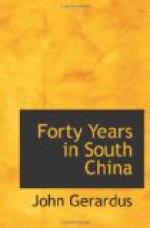“Now let us consider the real or supposed evils of carrying out the decision of Synod.
“1. It will not be for the credit of our Church. She now has a name, with other Churches, for putting forth efforts to evangelize the world. Shall she mar this good name and acquire one for sectarianism, by putting forth efforts to extend herself, not her doctrines and order-they are not sectarian, and her missionaries esteem them as highly as do their brethren at home-but herself, even at the cost of dividing churches which the grace of God has made one? The decision of the last Synod may not be the result of sectarianism among the people of our Church. We do not think it is. But it will be difficult to convince our Presbyterian brethren and others that it is not so. By way of illustration I will suppose a case. A. is engaged in a very excellent work. B. comes to him, and the following dialogue ensues:
“B. ’Friend A., I am glad to see you engaged in so excellent a work. I also have concluded to engage in it. I should be glad to work with you. You know the proverbs, ‘Union is strength,’ and ‘Two are better than one.’
“A. ’Yes, yes, friend B., I know these proverbs and believe them as thoroughly as you do. But I have a few peculiarities about my way of working. They are not many, and they are not essential, but I think they are very useful, and wish to work according to them. Therefore, I prefer working alone.’
“B. ’Yes, friend A., we all have our peculiarities, and, if they be not carried too far, they may all be made useful. I have been making inquiries about yours, and I am glad to find they are not nearly so many, or so different from mine, as you suppose, and as I once supposed. The fact is, I rather like some of them, and though I may not esteem them all as highly as you do, still I am willing to conform to them; for I am fully persuaded that, in work of this kind, two working together can do vastly more than two working separately, and the work will be much better done. Besides this, the social intercourse will be delightful.’
“A. ’I appreciate, friend B., your politeness, and am well aware that all you say about the greater efficiency and excellence of united work and the delights of social intercourse is perfectly true. But—but—well, I prefer to work alone.’
“2. It will injure the efficiency of the Church at Amoy. Besides the objection furnished by the increase of denominations, which the heathen will thus, as readily as the irreligious in this country, be able to urge against Christianity, it will deprive the churches of the benefit of the united wisdom and strength of the whole of them for self-cultivation and for Christian enterprise, and will introduce a spirit of jealous rivalry among them. We know it is said that there need be no such result, and that the native churches may remain just as united in spirit after the organization of two denominations as before. Such a sentiment takes for granted, either that ecclesiastical organization has in fact no efficiency, or that the Chinese churches have arrived at a far higher state of sanctification than the churches have attained to in this land. Do not different denominations exhibit jealous rivalry in this land? Is Chinese human nature different from American?




